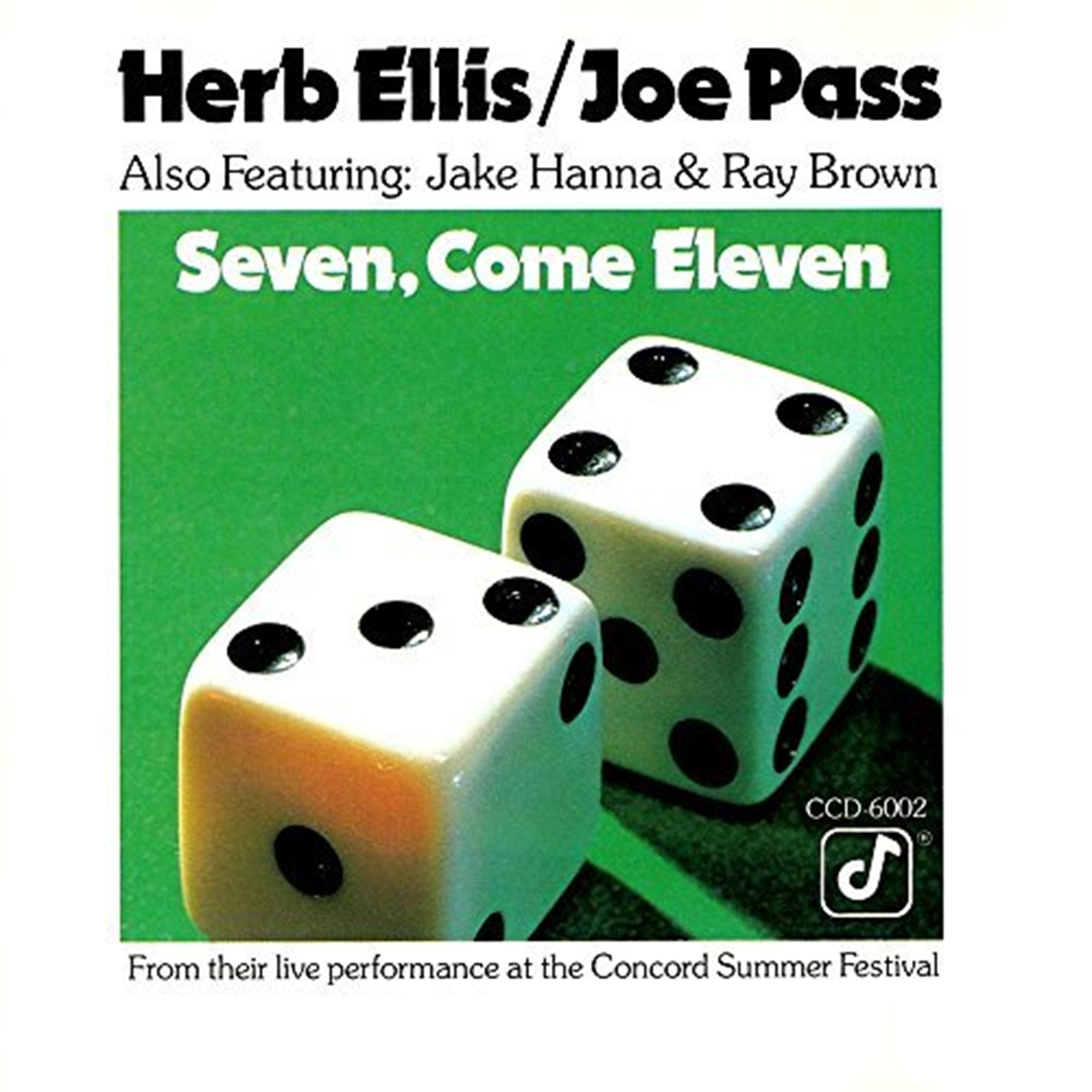When it comes to jazz guitar, few names carry the same prestige as Joe Pass and Herb Ellis. Both emerged from slightly different backgrounds—Pass was widely celebrated for his masterful chord-melody approach and unerring sense of time, while Ellis came up through the ranks playing with the likes of Oscar Peterson, honing a blues-inflected style that balanced clarity and swing. Their collaborative spirit on Seven, Come Eleven reveals not only their individual strengths but also their warm sense of camaraderie. Underneath their playful exchanges is the sturdy support of Ray Brown on bass and Jake Hanna on drums, creating a quartet that gels beautifully from tune to tune.
About Joe Pass
Joe Pass gained recognition for his flawless technique and sophisticated harmonies. His approach often featured single-note lines peppered with quick bursts of chords, a combination that gave his solos a lively yet full-bodied sound. A strong sense of groove underpinned every phrase he played, and on this album, you can hear how he frequently nudges the band toward new ideas with subtle rhythmic shifts or melodic gestures. Pass was also known for his intuitive ability to react to what his fellow musicians were doing, which is especially clear when he and Ellis exchange short bursts of riffs and comping.
About Herb Ellis
Herb Ellis developed his signature style during his tenure with the Oscar Peterson Trio, where he learned how to complement a piano-led ensemble without sacrificing his own voice. He struck a balance between a clean, articulate lead sound and a slightly bluesy edge that lent warmth to his improvisations. Ellis had a special gift for weaving thoughtful chord voicings behind solos—something that pairs beautifully with Pass’s chord-melody expertise. On Seven, Come Eleven, Ellis’s solos often veer into tuneful licks steeped in the history of swing guitar (think Charlie Christian), perfectly offsetting Pass’s fluid approach.
Track-by-Track Highlights
1. “In a Mellow Tone”
A Duke Ellington classic, “In a Mellow Tone” introduces the album’s easygoing vibe. Right from the opening bars, Ellis and Pass trade phrases with a sense of effortlessness, hinting at the shared language they’ve developed over years of experience. Brown’s walking bass lines supply the core pulse, and Hanna’s brushwork adds understated momentum. Together, they set a warm and welcoming stage for both guitarists to craft melodic embellishments around Ellington’s timeless theme.
2. “Seven Come Eleven”
Originally composed by Benny Goodman and Charlie Christian, this tune gives Ellis and Pass a chance to engage in playful back-and-forth exchanges. They’ll often finish each other’s phrases or slide into short bursts of unison lines that remind listeners of how closely attuned they are to each other’s style. Brown’s steady, resonant tone helps root the piece, while Hanna’s crisp cymbal accents keep the swing lively. You can almost hear a grin in the playing as they joyfully move from one chorus to the next.
3. “Prelude to a Kiss”
Another gem from the Ellington songbook, “Prelude to a Kiss” slows down the tempo and places focus on the duo’s lyrical sensitivity. Each guitarist offers a thoughtful, measured solo, employing soft chord voicings and delicate single-note lines. Brown and Hanna maintain a gentle foundation, never intruding on the intimacy of the piece. You might catch hints of conversation in the background—small affirmations that reflect the relaxed camaraderie in the studio.
4. “Perdido”
“Perdido,” yet another Ellington-associated standard, shifts back into an energetic mood. Ellis and Pass launch into buoyant solos that embody the tune’s upbeat character. Listen for the subtle ways they comp for each other—one will provide rhythmic punches while the other explores melodic runs. Brown’s bass playing is especially propulsive here, offering an undercurrent that nudges the ensemble forward, and Hanna’s tasteful drumming glues it all together.
5. “I’m Confessin’ (That I Love You)”
On this sweet, sentimental standard, the guitars take a more introspective approach. Ellis and Pass wrap the melody in gentle phrases, leaving just enough space for each to respond without overshadowing the other. Their solos highlight the beauty of the tune, focusing on clear melodic statements rather than flashy technique. Brown and Hanna remain respectfully subdued, allowing the guitarists’ chemistry to shine through in soft, heartfelt lines.
6. “Easy Living”
“Easy Living” continues the graceful atmosphere, showcasing how seamlessly Ellis and Pass merge their voices. Each musician handles the melody with care, at times slipping into lovely chord-melody passages. Brown’s bass lines keep everything anchored, and Hanna’s light percussion underscores the tune’s laid-back charm. By the time the guitars conclude their final statements, the overall mood is that of musicians quietly enjoying every moment of the session.
7. “Concord Blues”
The album closes with a nod to the label that fostered so many great jazz guitar recordings: Concord Jazz. “Concord Blues” is a medium-tempo romp that lets Ellis and Pass bring a blues-tinged bounce to the forefront. Their interplay swings between traditional blues licks and subtle harmonic twists. Brown’s walking lines are as solid as ever, and Hanna’s rhythmic shadings add a spirited edge. The group seems to savor each chorus, finishing the record on an upbeat note that underlines their friendly synergy.
Seven, Come Eleven stands as a great illustration of what happens when two masters of jazz guitar join forces with a stellar rhythm section. Joe Pass’s sophisticated approach intertwines seamlessly with Herb Ellis’s bluesy swing, creating an atmosphere that feels casual and focused all at once. The presence of Ray Brown and Jake Hanna completes the circle, ensuring each tune moves forward with clarity and purpose. Listening in, you’re treated to an experience that is warm, inviting, and full of spontaneous chemistry—an embodiment of the joy that lies at the heart of jazz guitar.






















